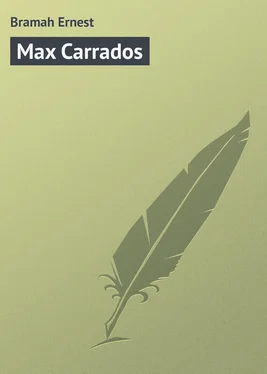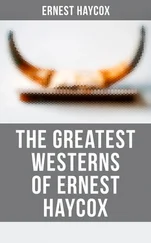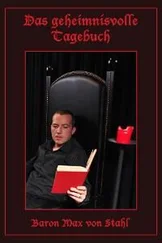Ernest Bramah - Max Carrados
Здесь есть возможность читать онлайн «Ernest Bramah - Max Carrados» — ознакомительный отрывок электронной книги совершенно бесплатно, а после прочтения отрывка купить полную версию. В некоторых случаях можно слушать аудио, скачать через торрент в формате fb2 и присутствует краткое содержание. Жанр: Классический детектив, foreign_detective, foreign_prose, на английском языке. Описание произведения, (предисловие) а так же отзывы посетителей доступны на портале библиотеки ЛибКат.
- Название:Max Carrados
- Автор:
- Жанр:
- Год:неизвестен
- ISBN:нет данных
- Рейтинг книги:4 / 5. Голосов: 1
-
Избранное:Добавить в избранное
- Отзывы:
-
Ваша оценка:
- 80
- 1
- 2
- 3
- 4
- 5
Max Carrados: краткое содержание, описание и аннотация
Предлагаем к чтению аннотацию, описание, краткое содержание или предисловие (зависит от того, что написал сам автор книги «Max Carrados»). Если вы не нашли необходимую информацию о книге — напишите в комментариях, мы постараемся отыскать её.
Max Carrados — читать онлайн ознакомительный отрывок
Ниже представлен текст книги, разбитый по страницам. Система сохранения места последней прочитанной страницы, позволяет с удобством читать онлайн бесплатно книгу «Max Carrados», без необходимости каждый раз заново искать на чём Вы остановились. Поставьте закладку, и сможете в любой момент перейти на страницу, на которой закончили чтение.
Интервал:
Закладка:
“I shall be ‘almost’ blind here, Parkinson,” remarked Carrados, walking about the room. “It saves explanation.”
“Very good, sir,” replied Parkinson.
Five minutes later, an interval suggesting that Miss Chubb also found it rather early in the afternoon, Carrados was arranging to take rooms for his attendant and himself for the short time that he would be in London, seeing an oculist.
“One bedroom, mine, must face north,” he stipulated. “It has to do with the light.”
Miss Chubb replied that she quite understood. Some gentlemen, she added, had their requirements, others their fancies. She endeavoured to suit all. The bedroom she had in view from the first did face north. She would not have known, only the last gentleman, curiously enough, had made the same request.
“A sufferer like myself?” inquired Carrados affably.
Miss Chubb did not think so. In his case she regarded it merely as a fancy. He had said that he could not sleep on any other side. She had had to turn out of her own room to accommodate him, but if one kept an apartment-house one had to be adaptable; and Mr Ghoosh was certainly very liberal in his ideas.
“Ghoosh? An Indian gentleman, I presume?” hazarded Carrados.
It appeared that Mr Ghoosh was an Indian. Miss Chubb confided that at first she had been rather perturbed at the idea of taking in “a black man,” as she confessed to regarding him. She reiterated, however, that Mr Ghoosh proved to be “quite the gentleman.” Five minutes of affability put Carrados in full possession of Mr Ghoosh’s manner of life and movements – the dates of his arrival and departure, his solitariness and his daily habits.
“This would be the best bedroom,” said Miss Chubb.
It was a fair-sized room on the first floor. The window looked out on to the roof of an outbuilding; beyond, the deep cutting of the railway line. Opposite stood the dead wall that Mr Carlyle had spoken of.
Carrados “looked” round the room with the discriminating glance that sometimes proved so embarrassing to those who knew him.
“I have to take a little daily exercise,” he remarked, walking to the window and running his hand up the woodwork. “You will not mind my fixing a ‘developer’ here, Miss Chubb – a few small screws?”
Miss Chubb thought not. Then she was sure not. Finally she ridiculed the idea of minding with scorn.
“If there is width enough,” mused Carrados, spanning the upright critically. “Do you happen to have a wooden foot-rule convenient?”
“Well, to be sure!” exclaimed Miss Chubb, opening a rapid succession of drawers until she produced the required article. “When we did out this room after Mr Ghoosh, there was this very ruler among the things that he hadn’t thought worth taking. This is what you require, sir?”
“Yes,” replied Carrados, accepting it, “I think this is exactly what I require.” It was a common new white-wood rule, such as one might buy at any small stationer’s for a penny. He carelessly took off the width of the upright, reading the figures with a touch; and then continued to run a finger-tip delicately up and down the edges of the instrument.
“Four and seven-eighths,” was his unspoken conclusion.
“I hope it will do, sir.”
“Admirably,” replied Carrados. “But I haven’t reached the end of my requirements yet, Miss Chubb.”
“No, sir?” said the landlady, feeling that it would be a pleasure to oblige so agreeable a gentleman, “what else might there be?”
“Although I can see very little I like to have a light, but not any kind of light. Gas I cannot do with. Do you think that you would be able to find me an oil lamp?”
“Certainly, sir. I got out a very nice brass lamp that I have specially for Mr Ghoosh. He read a good deal of an evening and he preferred a lamp.”
“That is very convenient. I suppose it is large enough to burn for a whole evening?”
“Yes, indeed. And very particular he was always to have it filled every day.”
“A lamp without oil is not very useful,” smiled Carrados, following her towards another room, and absentmindedly slipping the foot-rule into his pocket.
Whatever Parkinson thought of the arrangement of going into second-rate apartments in an obscure street it is to be inferred that his devotion to his master was sufficient to overcome his private emotions as a self-respecting “man.” At all events, as they were approaching the station he asked, and without a trace of feeling, whether there were any orders for him with reference to the proposed migration.
“None, Parkinson,” replied his master. “We must be satisfied with our present quarters.”
“I beg your pardon, sir,” said Parkinson, with some constraint. “I understood that you had taken the rooms for a week certain.”
“I am afraid that Miss Chubb will be under the same impression. Unforeseen circumstances will prevent our going, however. Mr Greatorex must write to-morrow, enclosing a cheque, with my regrets, and adding a penny for this ruler which I seem to have brought away with me. It, at least, is something for the money.”
Parkinson may be excused for not attempting to understand the course of events.
“Here is your train coming in, sir,” he merely said.
“We will let it go and wait for another. Is there a signal at either end of the platform?”
“Yes, sir; at the further end.”
“Let us walk towards it. Are there any of the porters or officials about here?”
“No, sir; none.”
“Take this ruler. I want you to go up the steps – there are steps up the signal, by the way?”
“Yes, sir.”
“I want you to measure the glass of the lamp. Do not go up any higher than is necessary, but if you have to stretch be careful not to mark on the measurement with your nail, although the impulse is a natural one. That has been done already.”
Parkinson looked apprehensively around and about. Fortunately the part was a dark and unfrequented spot and everyone else was moving towards the exit at the other end of the platform. Fortunately, also, the signal was not a high one.
“As near as I can judge on the rounded surface, the glass is four and seven-eighths across,” reported Parkinson.
“Thank you,” replied Carrados, returning the measure to his pocket, “four and seven-eighths is quite near enough. Now we will take the next train back.”
Sunday evening came, and with it Mr Carlyle to The Turrets at the appointed hour. He brought to the situation a mind poised for any eventuality and a trenchant eye. As the time went on and the impenetrable Carrados made no allusion to the case, Carlyle’s manner inclined to a waggish commiseration of his host’s position. Actually, he said little, but the crisp precision of his voice when the path lay open to a remark of any significance left little to be said.
It was not until they had finished dinner and returned to the library that Carrados gave the slightest hint of anything unusual being in the air. His first indication of coming events was to remove the key from the outside to the inside of the door.
“What are you doing, Max?” demanded Mr Carlyle, his curiosity overcoming the indirect attitude.
“You have been very entertaining, Louis,” replied his friend, “but Parkinson should be back very soon now and it is as well to be prepared. Do you happen to carry a revolver?”
“Not when I come to dine with you, Max,” replied Carlyle, with all the aplomb he could muster. “Is it usual?”
Carrados smiled affectionately at his guest’s agile recovery and touched the secret spring of a drawer in an antique bureau by his side. The little hidden receptacle shot smoothly out, disclosing a pair of dull-blued pistols.
Читать дальшеИнтервал:
Закладка:
Похожие книги на «Max Carrados»
Представляем Вашему вниманию похожие книги на «Max Carrados» списком для выбора. Мы отобрали схожую по названию и смыслу литературу в надежде предоставить читателям больше вариантов отыскать новые, интересные, ещё непрочитанные произведения.
Обсуждение, отзывы о книге «Max Carrados» и просто собственные мнения читателей. Оставьте ваши комментарии, напишите, что Вы думаете о произведении, его смысле или главных героях. Укажите что конкретно понравилось, а что нет, и почему Вы так считаете.












